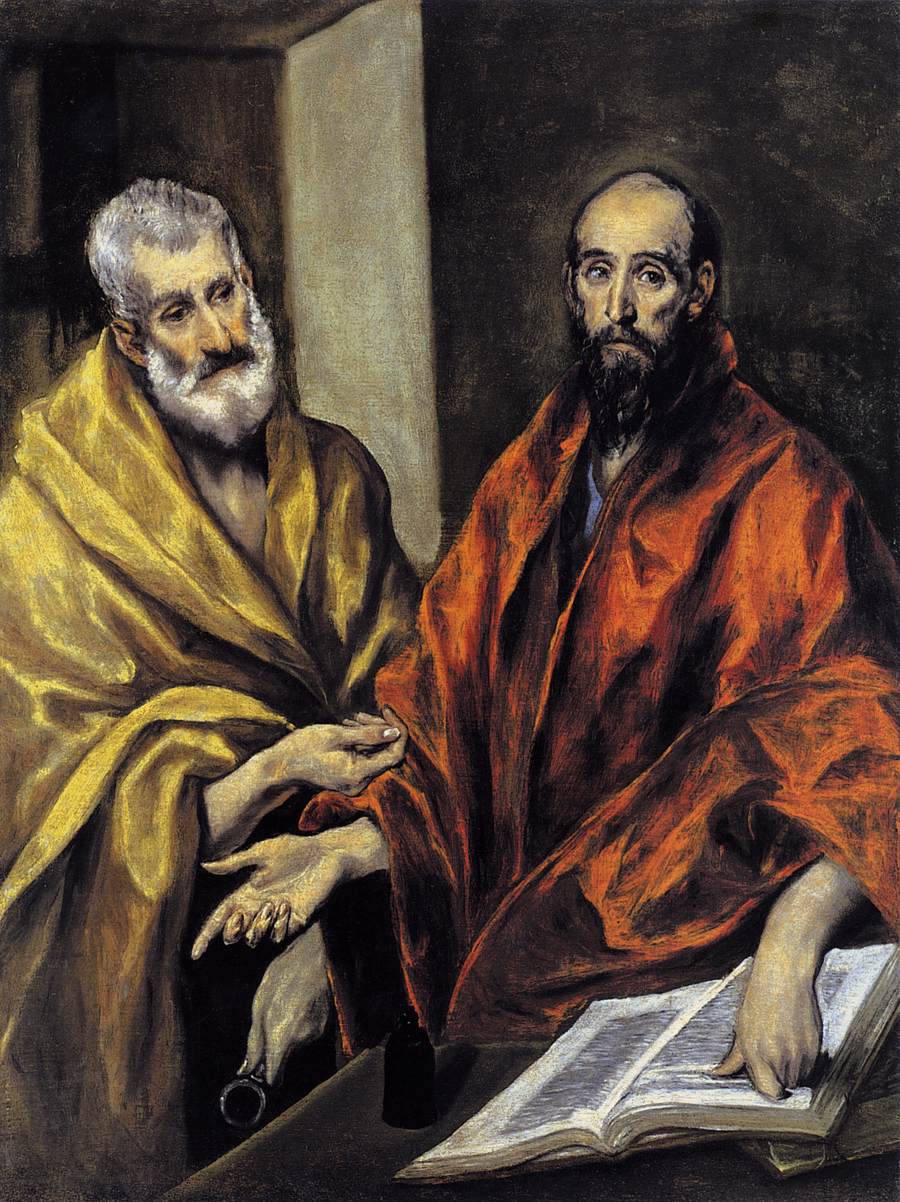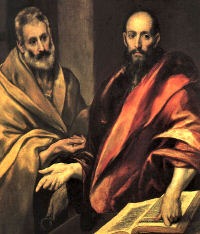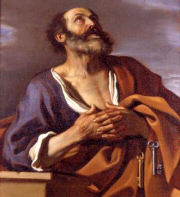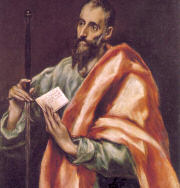Five Facts of Faith from the Life of St. Peter – A Homily for the Feast of Saints Peter and Paul

Today’s Feast of Saints Peter and Paul honors two fundamental pillars of the early Church. While all the Apostles form the foundation, Peter and Paul stand out very profoundly in terms of influence and work. And while some have wished to suggest division between them, the Church insists that they must been seen together; hence their feast is set forth in this way.
Indeed, those who see division between them base it on only one text from Galatians (2:11) wherein St. Paul withstood Peter so as to correct him. Peter had taught rightly concerning the inclusion of the Gentiles but, at least according to St. Paul’s report, he struggled to associate with them more freely and was fearful of the Judaizers. Yes, even popes are not beyond reproach. We argue that popes are prevented from formally teaching error in faith or morals (Peter did not teach erroneously), not that they are sinless.
Nevertheless, the same Paul had gone to visit St. Peter in order to get to know him (Gal 1:18) and later submitted his teachings to Peter and others in Jerusalem for scrutiny (Gal 2:1-10). And at the Council of Jerusalem, Paul and Peter were allies (Acts 15).
Thus we ought not exaggerate differences beyond the evidence. The Church today bids us to celebrate them together.
Many different approaches to the reading could be taken today. But since the chief work of the Church and the Apostles is to draw us to faith, it behooves us to look in detail at the first reading from today’s Mass and see in it a kind of roadmap to growing in faith. Peter’s story and experience were not just for him; they were for us as well. Let’s see what we can learn as we focus on five facts of faith from the story of St. Peter in today’s first reading.
I. The Persecution of Faith - Persecution is the normal state of affairs for a Christian. Not every Christian suffers equally at every stage and place in history, but Jesus spoke often about the need to be willing to endure persecution for His sake. He said, A servant is not greater than his master. If they persecuted me, they will persecute you also (Jn 15:20). He added, If you belonged to the world, it would love you as its own. As it is, you do not belong to the world, but I have chosen you out of the world. That is why the world hates you (Jn 15:19). He said elsewhere, In the world ye shall have tribulation: but be of good cheer; I have overcome the world (Jn 16:33). He also warns, Woe to you when everyone speaks well of you, for that is how their ancestors treated the false prophets (Lk 6:26).
And therefore, persecution should be expected. If it is wholly absent, we may have some soul-searching to do as to whether we are witnessing to the Faith authentically.
And so, in this passage, we should not be surprised to see how the early Church was persecuted. In this Gospel is described the persecution, driven by Herod, that breaks out in Jerusalem. In this persecution, James, (of “Peter, James, and John” fame) is killed! Peter is also rounded up and slated for death. Sitting in prison, he awaits his fate.
Note the strange excessiveness of the persecution. Peter is secured with double chains and is forced to sleep between two soldiers. And outside there are even more guards keep watch. Wowza! Here’s a persecution that is strangely excessive and obviously rooted in no small degree of fear!
And yet as we look at persecution today, we notice something similar. There seems to be a very special hatred for Christians, especially Catholics. Note for example that in the public school system it is permissible to speak about almost anything: how to use condoms, homosexuality, and even certain religions such as Islam. But if the name of Jesus is even mentioned, or Scripture is even obliquely referenced, lawsuits are threatened and television cameras appear! What is this strange fear and hatred for Christ? Jews, Buddhists, Muslims, Zoroastrians, and even Methodists and Episcopalians do not face similar hostility!
While this animosity is somewhat mysterious, it does speak to us of the uniqueness of Jesus Christ and particularly of the Church He founded: the Catholic Church. Satan surely inspires special hatred for Jesus and His Church. So in a certain sense, we can take it as a sign of credibility—even as a compliment. Perhaps too, it is the fact that deep down, they know that what Jesus and His Church teaches is right.
The prince of this world hates Jesus, and has always inspired his followers to do so as well, whether consciously or unconsciously. Yes, persecution is a natural, expected ordeal for a Christian.
II. The Prayer of Faith - In the midst of this, we note that the Church is described as praying fervently to God. The Greek word translated here as fervent is ἐκτενῶς (ektenos), which means “fully stretched.” It is the image of a taught rope that is invoked. Here is prayer that is stretched out, that is costly, that involves more than a brief moment or two. Here is praying that is persevering. This sort of prayer involves more than an honorable mention in the Prayers of the Faithful at Mass. Here is the sort of prayer that involves long hours. Time is invested; effort is expended; energy is invested. It is the sort of prayer that nags God until the solution is at hand.
There is an expression in the African-American community, “by and by.” It refers to the need to be patient and persevering in prayer while waiting for God to answer “by and by.” In other words, God will answer in His own time. It is for us to keep praying. And here is prayer without ceasing; it does not give way to discouragement, but just keeps on praying.
III. The Prescription of Faith - In the midst of this fervent prayer of the Church, a hidden process begins. An angel is dispatched from Heaven, enters the jail, and comes to Peter. His instructions to Peter amount to a kind a prescription for a life of faith, and we note it in four stages:
A. Rise! - The angel says, “Get up”. Here is a call to rise from death, to rise from despairing and doubt, to stand up! Every Christian must die to sin and rise to new life, must die to slavery and despair and rise as a free and active agent, ready to walk with God.
B. Restrain - The angel then tells him to put on his belt (or cincture). The belt (cincture) is traditionally a sign of chastity and of continence (restraint). The Christian life cannot be riddled with unchasteness or with other excesses of this world such as greed, gluttony, and other forms of intemperance. These hinder the journey; they weigh us down. And thus the instruction to tighten our belt.
C. Ready - Peter is also told to put on his sandals. Here is a symbol of readiness to make a journey. When I was a child, my mother would often signal me by saying, “Put on your shoes and get ready to go.” And thus Christians must be ready to make the journey with their feet shod with the gospel of peace, with their shoes on and ready to set out on the great pilgrimage with Jesus to Heaven. The pilgrimage goes up over the hill of Calvary and over into glory. Put your shoes on and get ready to go!
D. Righteous - Peter is then told to put on his cloak. The robe in Scripture is often equated with righteousness. For example the book of Revelation says it was given to the bride to be clothed in fine linen. The text goes on to say that the linen robe is the righteousness of the Saints (Rev 19:8). There is also the parable of the wedding guests, one of whom was not properly clothed, and was therefore thrown out (Mat 22:11). At a Baptism, the priest points to the white garment worn by the infant and tells everyone to see in this white garment the outward sign of his or her Christian dignity, and that the child is to bring this garment unstained to the great judgment seat of Christ. Thus the instruction of the angel reminds us that every Christian is to be clothed in righteousness, and is to be careful to keep this robe, given by God, unsoiled by the things of this world.
E. Run ! - Finally, there is the command of the angel to “Follow me.” In other words, run the race of faith. Toward the end of his life, St. Paul would say, “I have fought the good fight, I have finished the race, I have kept the faith” (2 Tim 4:7). Jesus told his disciples, simply, “Follow me.”
IV. The Procession of Faith- Following this there comes a series of instructions from the angel to Peter (and also to us). These instructions amount to a type of direction to make the procession of faith. We see three things:
A. Not easy – The text says that they passed the first guard, then a second, and finally came to an iron gate. And thus in our journey, there are obstacles and dangers. We must recall that we live in paradise lost. Life is not easy; it is hard. There are hurdles and perils. We are not called to avoid them, we are called the face them with courage. God allows these in our life in order to test us, to see if we will follow Peter’s example and move past the one guard, then the second, and then the apparently locked gate (which God opens for us). Life is not easy, but God’s grace conquers the challenge, if we only trust Him.
B. Narrow – The text here describes a narrow alley through which Peter and the angel pass. Jesus spoke of the way that leads to salvation as a narrow way (e.g., Mat 7:14). Why is this so? Because the narrow way is the cross! Most are not interested in this difficult path, the path that is steep and narrow. Most look for the broad highway through the valley, the easy way. The world still insists that we live in paradise (which Adam rejected) and that life should be easy. It is a lie; the path now is over the hill of Calvary. It is a narrow and steep path, but it is the only true way to glory. Avoid preachers who never mention sin, who never speak of repentance, who never speak of struggles and difficulties. Avoid them; for the tuning fork, the A440 of the Gospel is the cross. There are glories and joys in this life to be sure, but the fundamental path to Heaven and glory is through the cross. It cannot be avoided. Walk the narrow way, the way of the cross. Do not listen to the “prosperity preachers” who exaggerate one truth, excluding all others.
C. Need an angel – As soon as Peter emerges from the prison and out into the openness of freedom, the angel disappears. But until this point, he needed an angel! And so do we. Though demons are roaming and patrolling this earth, so are God’s Angels. We all have an angel assigned to us, and many other angels along the way to help us. Never forget this. We do not journey alone. For every demon, there are two angels (Rev 9:15). Stop fearing demons and call on God’s angels, trusting in God’s grace.
V. The Product of Faith - There comes finally the product of faith wherein Peter is able to confidently assert, Now I know without a doubt that the Lord has sent his angel and rescued me (Acts 12:11). Do you know this? Or is it only true because others have said so? Do you experience God’s saving glory? Have you experienced him rescue you? How? Do you have a testimony? The normal Christian life is to know and experience that our God can and does rescue us from this hell-bound, sin-soaked world. We have a God who can make a way out of no way, and can, as St. Paul says, Rescue us from this present evil age (Gal 1:4). Do you know this? Have you experienced this? Then tell someone! It is the product of faith!







